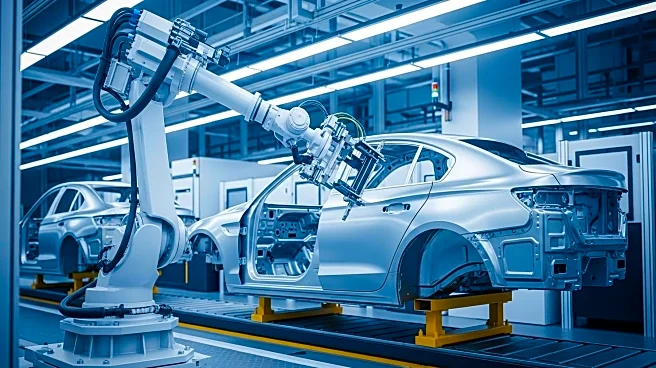What's Happening?
Stellantis NV, the automotive manufacturer known for its Jeep and Ram brands, has announced a significant investment of $13 billion in the United States over the next four years. This strategic move aims
to enhance its business operations in the U.S. market, which is crucial for the company, and to mitigate the adverse effects of tariffs. The investment, the largest in Stellantis' history, is expected to increase the company's annual finished vehicle production by 50% compared to current levels. The funds will be allocated towards research and development, supplier costs, and manufacturing operations, reflecting Stellantis' commitment to strengthening its presence in the U.S. automotive sector.
Why It's Important?
This investment is pivotal for Stellantis as it seeks to navigate the challenges posed by tariffs and maintain competitiveness in the U.S. market. By boosting production capacity, Stellantis aims to meet growing consumer demand and enhance its market share in the automotive industry. The investment also underscores the company's focus on innovation and operational efficiency, which are essential for long-term growth. The U.S. automotive sector stands to benefit from increased production capabilities, potentially leading to job creation and economic stimulation. However, the impact of tariffs remains a concern, influencing cost structures and pricing strategies.
What's Next?
Stellantis will likely focus on implementing its investment plan, which includes expanding manufacturing operations and enhancing research and development efforts. The company may also engage with suppliers to optimize production processes and reduce costs. Stakeholders, including industry leaders and policymakers, will be monitoring the impact of this investment on the U.S. automotive market and its ability to counteract tariff-related challenges. Future developments may include strategic partnerships or collaborations to further bolster Stellantis' market position.
Beyond the Headlines
The investment by Stellantis could signal a broader trend among automakers to increase domestic production in response to international trade pressures. This move may prompt other companies to reevaluate their strategies and consider similar investments to safeguard against tariff impacts. Additionally, the focus on research and development highlights the industry's shift towards innovation and sustainability, potentially influencing future automotive technologies and consumer preferences.








